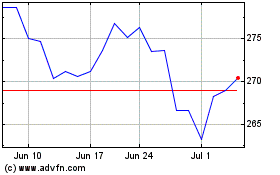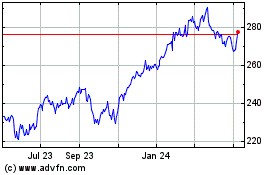By Xie Yu, Avantika Chilkoti and Paul Vigna
Stocks rallied Monday as investors cheered early signs that
lockdowns in the U.S. and Europe may be helping slow the
coronavirus pandemic, even as Americans brace for another difficult
week.
Major indexes in the U.S. opened sharply higher, held relatively
steady for most of the day and then soared in the final 10 minutes
of the trading session. A late surge in tech stocks, including
Visa, Microsoft and Apple, turbocharged the gains: the Dow Jones
Industrial Average ended the session up more than 1,600 points.
All 30 stocks in the index climbed, as did all 11 sectors in the
S&P 500. Beaten-down retail and travel stocks were among the
biggest gainers. Kohl's, Nordstrom, Carnival and Marriott
International each climbed at least 19%, though all four stocks are
still down more than 50% for the year.
Signs of progress in the fight against coronavirus drove the
optimism.
New York Gov. Andrew Cuomo said the number of daily deaths from
Covid-19, the pneumonialike disease caused by the virus, have been
"effectively flat" in his state for the past two days, suggesting
social-distancing measures have proved effective. The number of
daily hospitalizations, intubations and people in intensive care
units is also down.
"Everyone is just desperate for good pieces of news," said Peter
Cecchini, chief market strategist at Cantor Fitzgerald. "It doesn't
necessarily reflect anything fundamental. Nothing's changed."
Indeed, with volatility in the market as elevated as it has been
lately, he said, Monday's swings are typical.
The Dow Jones Industrial Average jumped 1,627.46 points, or
7.7%, to 22679.99, though it is still down 21% this year. The
S&P 500 rose 175.03 points, or 7%, to 2663.68. The Nasdaq
Composite gained 540.15 points, or 7.3%, to 7913.24.
Monday's gain was the Dow's 12th consecutive move up or down of
at least 1%, the longest such streak since March 2009, and its 28th
consecutive move up or down at least 0.5%, according to Dow Jones
Market Data. A streak like that last occurred in October 1931
during the Great Depression when the index rose or fell at least
0.5% on 33 consecutive trading days.
The tech sector led the way in the S&P 500, rising 8.8%. The
late surge pushed Visa shares up 12%, Apple up 8.7% and Microsoft
up 7.4%.
Whatever path the pandemic takes, the damage on economic growth
is going to be significant, said Fred Cannon, the director of
research at Keefe Bruyette & Woods. He expects a slow recovery,
with growth at the end of 2021 still about 5% below its level from
before the downturn.
As for the market, "I tend to not believe a bottom's been hit,"
he said, "because we don't know what the end point of the economy
is."
At least one-quarter of the U.S. economy has gone idle as
authorities curtailed travel and activity, an analysis conducted
for The Wall Street Journal showed.
JPMorgan Chase Chief Executive James Dimon said in his annual
letter that he expects "a bad recession." The country wasn't
prepared for a pandemic, but "we can and should be more prepared
for what comes next."
The pandemic has brought some businesses to a standstill.
Airlines, for example, are cutting flight schedules, putting
expansion plans on hold and looking for places to park their idle
planes.
Most recently, they have significantly cut travel to New York as
the crisis there worsens; United Airlines, for one, cut 90% of its
flights to New York. Its shares rallied Monday. United climbed 5%,
while American Airlines rose 1.2%.
Some investors remain cautious about the prospects of a
sustained market rally. Volatility remains high and cross-asset
correlations -- the typical relationship between the price of
different assets -- has broken down, suggesting the market is still
under stress, according to Dwyfor Evans, head of macro-strategy for
the Asia-Pacific region at State Street Global Markets in Hong
Kong.
"We have good days and bad days. Sometimes they follow each
other," Mr. Evans said.
The yield on 10-year Treasurys rose to 0.675%, up from 0.587%
Friday. The market for U.S. government debt, normally the most
liquid and actively traded bond market in the world, has calmed in
recent weeks following a string of extraordinary measures by the
Federal Reserve. Yields rise when bond prices drop.
Oil markets struggled to find their footing. Major oil-producing
nations are preparing to meet Thursday to discuss how to address
the global glut in supply.
West Texas Intermediate crude, the U.S. oil benchmark, fell 8%
to $26.08 a barrel. An emergency summit to discuss global
production cuts was pushed back from Monday to later in the week
amid continued tensions between Saudi Arabia and Russia. Investors
are growing increasingly concerned that a failure to cut output may
result in the world running out of storage space for excess crude.
Limiting production may also not be enough to offset the drop in
demand.
"Even if they sort out something on the supply side, it probably
won't be big enough to offset what's happening on the demand side,"
said Lyn Graham-Taylor, a strategist at Rabobank.
Strict containment measures also showed signs of helping slow
the spread of the virus in parts of Europe, including Italy and
Spain. Both countries are now recording fewer daily deaths than
they have in over a week, and the pressure on hospitals in Italy is
beginning to ease, officials said.
The pan-continental Stoxx Europe 600 index gained 3.7%. In
Asia-Pacific markets, Australia's benchmark S&P/ASX 200 index
closed up 4.3%. Japan's Nikkei 225 rose 4.2%. Markets in mainland
China were closed for a holiday.
Write to Xie Yu at Yu.Xie@wsj.com, Avantika Chilkoti at
Avantika.Chilkoti@wsj.com and Paul Vigna at paul.vigna@wsj.com
(END) Dow Jones Newswires
April 06, 2020 16:59 ET (20:59 GMT)
Copyright (c) 2020 Dow Jones & Company, Inc.
Visa (NYSE:V)
Historical Stock Chart
From Aug 2024 to Sep 2024

Visa (NYSE:V)
Historical Stock Chart
From Sep 2023 to Sep 2024
